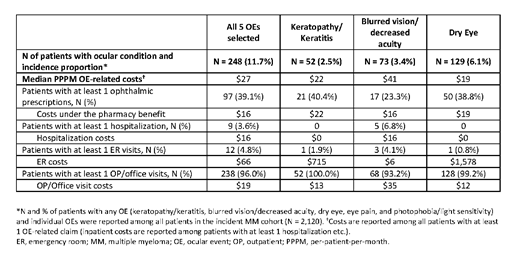Introduction: Some novel cancer and supportive care therapies, such as chemotherapy, steroids, and immunotherapies, are known to cause eye-related side effects such as dryness or altered vision (Fu et al Oncotarget 2017). However, there is a paucity of evidence documenting their disease burden in practice. The aim of this retrospective, cohort study was to assess the incidence, and clinical and economic burden of managing ocular events (OEs) in patients receiving multiple myeloma (MM) treatment in clinical practice.
Methods: A cohort of adult patients with MM was identified from a large U.S. insurance claims database (IQVIA PharMetrics® Plus database), which is sourced from commercial insurance companies. Incidence, outpatient care, emergency room (ER) visits, hospitalizations, and costs were assessed for 5 OEs of interest: keratopathy/keratitis, blurred vision/decreased acuity, dry eye, eye pain, and photophobia. These OEs were identified by cross-walking from MedDRA 'corneal disorders' codes to international classification of disease (ICD) codes, which were confirmed by clinical experts. Incidence of OEs was assessed as the proportion of patients with OE after MM treatment initiation who did not have diagnosis indicative of OE in the 12-month baseline period. Descriptive analyses were performed, and resource utilization and costs (in US dollars) were reported on a per-patient-per-month (PPPM) basis. A separate cohort of hematology patients (N=26,923) was identified from the same database. The results were benchmarked against this larger cohort of patients.
Results: Of the 2120 patients with incident MM (mean [SD] age: 60.2 [9.8]) included in the cohort, 248 (11.7%) patients had at least 1 incident OE during an average of 29.8 months of follow-up after initial MM treatment. Proportion of patients with at least 1 incident OE was 7.4% in the benchmark hematology cohort. Dry eye (n=129, 6.1%), blurred vision/decreased acuity (n=73, 3.4%), and keratopathy/keratitis (n=52, 2.5%) were the most frequent OEs observed. The incidence remained largely constant across baseline demographic characteristics, comorbid conditions, and lines of MM therapies.
Most incident OEs were diagnosed in the outpatient (OP)/physician's office setting by ophthalmologists (69.5%), except for blurred vision, which was predominantly diagnosed in non-ophthalmologist/non-optometrist setting. Median PPPM costs for managing OEs was $27, which is <1% of median all-cause costs during the follow-up period (median total all-cause PPPM costs: $17,286; median MM-related PPPM costs: $13,851). These costs were predominantly contributed by OP care (median PPPM cost: $19), including prescriptions (median PPPM cost: $16). ER visits (median PPPM cost: $66) and inpatient visits (median PPPM cost: $16) were uncommon (Table). Median PPPM costs for managing these OEs in hematology cohort was $20.
Conclusions: Incident OEs were observed in ~12% of patients receiving treatment for MM based on real-world data, with the most common OEs being keratopathy/keratitis, dry eye, and blurred vision. When evaluated from the perspective of median PPPM costs, the clinical and economic burden for treating OEs was very low when compared with total all-cause PPPM costs or MM-related PPPM costs. The vast majority of these OEs require only OP care. ER visits or inpatient care were extremely rare. Further real-world evidence is warranted to assess the relationship between OEs and MM treatment.
Funding: GSK (study: 208295).
Table. Median OE-related PPPM Costs (US Dollars) in Incident MM Cohort (N=2,120)
Wang:GSK: Current Employment, Current equity holder in publicly-traded company. Ferrante:GSK: Current Employment, Current equity holder in publicly-traded company. Maiese:GSK: Current Employment, Current equity holder in publicly-traded company. Willson:GSK: Current Employment, Current equity holder in publicly-traded company. Chen:GSK: Consultancy, Research Funding. Nunna:GSK: Consultancy, Research Funding. Sun:GSK: Consultancy, Research Funding. Kleinman:GSK: Consultancy; Eyeon Therapeutics, LLC.: Current equity holder in private company; Triphase Accelerator U.S Corporation: Consultancy; ONL Therapeutics, Inc: Consultancy; Revolution Medicines, Inc: Consultancy; Editas Medicine, Inc: Consultancy; Cleave Therapeutics, Inc: Consultancy; Coherus Biosciences, Inc: Consultancy; Synergy Research Inc: Consultancy; Zenith Epigenetics Ltd: Consultancy. Sansbury:GSK: Current Employment, Current equity holder in publicly-traded company.
Author notes
Asterisk with author names denotes non-ASH members.


This feature is available to Subscribers Only
Sign In or Create an Account Close Modal